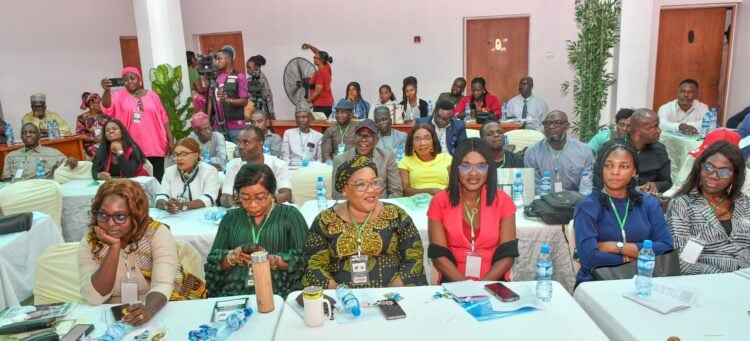Chevron Nigeria Limited (CNL), in collaboration with the Nigerian Union of Journalists (NUJ), Federal Capital Territory (FCT) Council, on Tuesday, organised a high-impact training workshop for over 70 journalists on the use of Artificial Intelligence (AI) in journalism.
The one-day workshop, themed “Harnessing Artificial Intelligence in Journalism,” was held in Abuja and sponsored by the NNPCL-Chevron Nigeria Limited Joint Venture.
Speaking at the event, General Manager, Policy, Government and Public Affairs at Chevron Nigeria, Olusoga Oduselu, represented by Victor Anyaegbudike, described the media as indispensable agenda-setters and opinion shapers in society. He emphasised Chevron’s longstanding belief in human capital development as a key to organizational and national success.
“As members of the fourth estate of the realm, your role as agenda-setters and opinion moulders cannot be over-emphasised,” Oduselu stated. “We continue to partner with the media for the development of society… That is why CNL pioneered the Advanced Writing and Reporting Skills (AWARES) programme in collaboration with Pan Atlantic University, Lagos. Over 120 journalists have benefitted from the programme since its inception in 2014.”
He reaffirmed Chevron’s commitment to supporting Nigerian content development through employment and contract opportunities, stating: “Chevron supports Nigerian Content development by providing employment to Nigerians, and contract opportunities in all our projects up to an estimated annual average of over $1 billion.”
Oduselu also expressed openness to collaboration with the press: “We are always open to dialogue and further discussions if you require clarifications on a story that directly affects our company or the oil and gas industry.”
In her keynote address, NUJ FCT Chairman, Comrade Grace Ike, applauded Chevron’s continued investment in media capacity building, stressing the need for journalists to embrace AI to stay competitive and relevant.
“We stand at a transformative moment in the history of journalism. Artificial Intelligence, AI, is no longer a distant concept but a powerful tool reshaping how we gather, verify, and deliver news,” Ike declared.
She emphasised AI’s role in combating misinformation, especially during critical periods such as elections and public health crises: “AI-powered platforms cross-reference claims against trusted databases and detect manipulated media like deepfakes. This strengthens the credibility of journalism by reducing errors and misinformation.”
Ike further encouraged journalists to adopt innovation boldly but responsibly, saying, “Let us embrace innovation boldly but responsibly, ensuring that technology enhances our mission to inform, enlighten, and serve society with courage and integrity.”
She concluded by calling for a mindset shift in journalism, “With the right mindset and tools, we can harness AI to tell stories that matter, faster and more accurately, while preserving the trust of our audiences.”
In a series of knowledge-rich sessions, leading experts took participants through the evolving media landscape.
Busola Ajibola, Deputy Director at the Centre for Journalism Innovation and Development, warned that journalists who ignore technological advancements risk obsolescence. “Journalists who fail to leverage AI will have their jobs threatened,” she said, urging practitioners to embrace innovations to sharpen their storytelling and investigative abilities.
On press freedom, Emman Usman Shehu, Director of the International Institute of Journalism (IIJ), speaking through veteran journalist Simon Musa Reef, discussed the Freedom of Information Act (FOIA) and its importance in holding public officials accountable.
He highlighted a recent milestone: “In April 2025, the Nigerian Supreme Court ruled that the FOIA applies to all tiers of government, including state institutions,” noting that this judgment removes the long-standing ambiguity about its applicability.
Despite the progress, he decried persistent challenges such as low public awareness, misuse of the Official Secrets Act, bureaucratic delays, and intimidation of journalists seeking information.
Lemmy Ughegbe, speaking on “Mental Health of Journalists in the Era of Social Media,” warned that online attacks go beyond technical issues and can cause real psychological harm.
“An online attack isn’t just technical. It is personal. It can cause real psychological harm,” Ughegbe said, adding that unchecked mental stress among journalists risks weakening public trust in the media.
He urged journalists to protect their mental health, stressing, “Protecting ourselves and our mental health is not selfish. It is an act of professional responsibility.”











